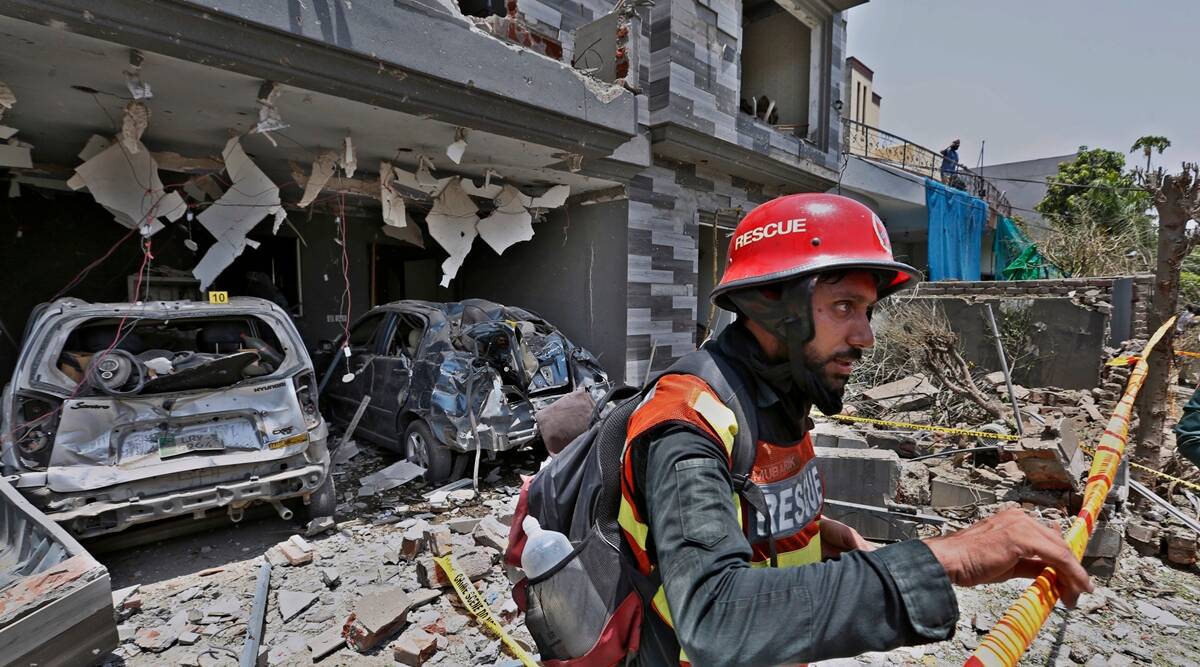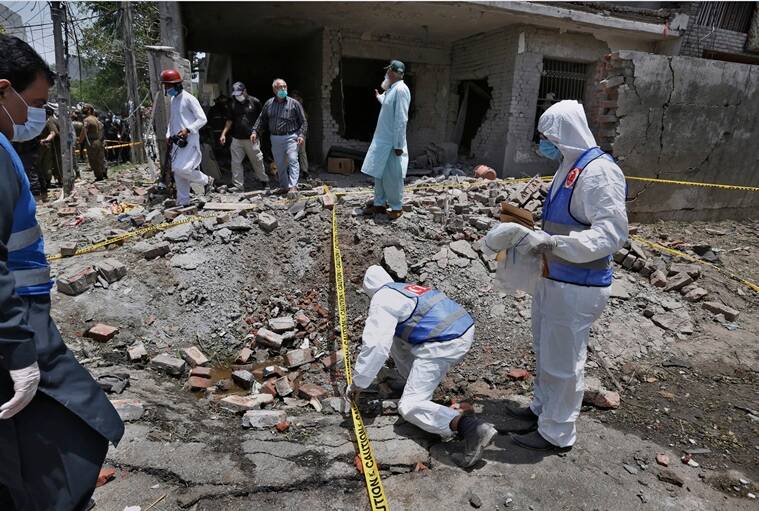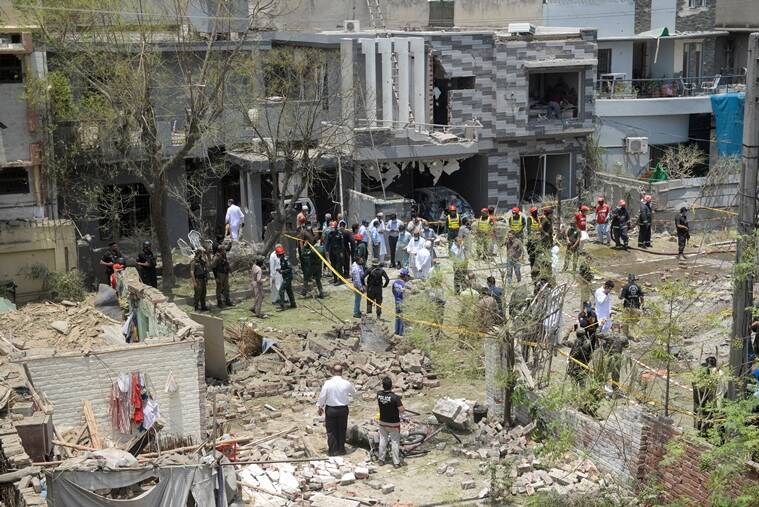 At the site of the June 23 blast in Lahore. (AP/File)
At the site of the June 23 blast in Lahore. (AP/File) Pakistan on Sunday ended its four-month pause on accusations and attacks against New Delhi, describing the June 23 bomb blast near the home of Jamaat-ud-Dawa chief Hafiz Saeed as “India-sponsored terrorism”.
Pakistan’s National Security Advisor Moeed Yusuf told reporters in Islamabad that the mastermind of the attack that killed three people and injured 24, “is an Indian citizen and he is associated with R&AW (Research and Analysis Wing)”.
On Twitter, Prime Minister Imran Khan alleged that the “planning & financing of this heinous terror attack has links to Indian sponsorship of terrorism against Pakistan”, and asked the “global community” to “mobilise international institutions against this rogue behaviour”.
There was no official response from the Ministry of External Affairs, but sources told The Indian Express that the Pakistani allegations were “baseless” and “false”.
Yusuf, who addressed a press conference along with the chief of police of Pakistan’s Punjab province, Inam Ghani, and the Pakistani Information Minister Fawad Chaudhry, said: “I want to make sure that our message is heard very clearly, about this particular incident on the 23rd of June in Lahore.
“We have concrete evidence and intelligence, including financial and telephone records, that point to direct Indian sponsorship of these terrorists.”
 Investigators collect evidence at the site of explosion in Lahore, Pakistan, Wednesday, June 23, 2021. (AP)
Investigators collect evidence at the site of explosion in Lahore, Pakistan, Wednesday, June 23, 2021. (AP)
Yusuf said that after forensic analysis of electronic equipment recovered from the alleged terrorists, “we have absolutely no doubt or reservation in informing you that the main mastermind belongs to R&AW, the Indian intelligence agency, is an Indian national, and is based in India”.
Ghani, the Punjab police chief, claimed that the Counter Terrorism Department (CTD) had apprehended the main perpetrators behind the attack, as well as their facilitators. The “lynchpin” who connects the attack with people outside Pakistan, was a man called Peter Paul David, he claimed.
“Peter arranged the car used in the blast. We have the details of his financing, his WhatsApp calls, and all other records…,” Ghani said.
On June 25, two days after the blast in Lahore’s Johar Town, Pakistani media had reported that a foreign national — now identified as “Peter Paul David” — had been taken off a Karachi-bound flight and moved to an undisclosed location for interrogation.
“The IG (Ghani) said we have intelligence of foreign intelligence agency, so today without a doubt I want to say, [the circumstances] of this entire attack lead to Indian-sponsored terrorism,” NSA Yusuf said.
He said the government had the fake names, real identities, and location of the suspects because of efficient coordination between agencies.
Six-year-old Abdul Haq, his father Abdul Malik (50), and a young passerby were killed in the blast that left a 4-foot deep and 8-foot wide crater on the road, and damaged several houses and shops nearby. Hafiz Saeed, the mastermind of the 26/11 Mumbai terror attacks, was of course, unhurt.
Pakistan’s accusations come at a time when the two sides are engaged in back-channel conversations to bring the bilateral relationship back on track. These talks have been ongoing for the past few months, with National Security Advisor Ajit Doval leading the Indian initiative with Pakistan’s civilian-military leadership.
Doval is learnt to have met Yusuf and ISI chief Lt Gen Faiz Hameed in a third country; he has also kept communication channels open with Pakistan Army chief General Qamar Javed Bajwa.
 Security officials and rescue workers survey the site after a blast in a residential area in Lahore, Pakistan June 23, 2021. (Reuters)
Security officials and rescue workers survey the site after a blast in a residential area in Lahore, Pakistan June 23, 2021. (Reuters)
In February, the two sides had agreed to adhere to the ceasefire pact along the border and LoC; that has now held for just over four months.
On June 23-24, Doval and Yusuf were in Dushanbe for a meeting of NSAs of the Shanghai Cooperation Organisation.
With Yusuf listening, Doval had “proposed an action plan against Lashkar-e-Taiba (LeT) and Jaish-e-Mohammad (JeM) as part of the SCO framework”.
He had said that “perpetrators of terrorism including cross-border terror attacks should be expeditiously brought to justice”, and had underlined the “need for full implementation of UN resolutions and targeted sanctions against UN designated terrorist individuals and entities” — a reference to the absence of action by Pakistan against Saeed and JeM chief Masood Azhar.
It emerged on Friday that on the night of June 26, hours before two drones dropped explosives on the IAF base in Jammu, a drone was spotted above the Indian High Commission in Islamabad.
Also on Friday, Jammu & Kashmir DGP Dilbag Singh had said that while the investigation into the IAF base bombing was still in progress, “we have past history of Lashkar using drones to drop weapons, narcotics on this side besides the ready-made Improvised Explosive Devices to be planted at various locations”.
Yusuf claimed on Sunday that the day of the Lahore bombing also saw thousands of coordinated cyber attacks on Pakistan’s information infrastructure.
“The cyber attacks were carried out so that our investigation could not be successful and it would face obstacles and time could be gained for the network to disperse,” he said.
However, the country’s institutions were “successful” because they had been strengthened to work on cybersecurity, he said.
“We have no doubt that the Johar Town and cyber attacks are linked. And the number in which [the cyber attacks] were done, there is no doubt that there was state involvement of our neighbour,” he added, referring to India.
According to Yusuf, the “direct origin” of the money used to carry out the attack was in India. “Money was sent through third countries; now time has come to pay attention to real criminals,” he said.
Ghani said the man who had carried out the attack, Eid Gul, was originally from Afghanistan and had lived in Pakistan. “We have [identified] the person who was delegated the task to carry out the reconnaissance and execute the attack,” he said, identifying the suspect as Eid Gul.
Another suspect, Ghani said, had taken the car used in the attack from Peter, and carried out a dry run in Lahore. A suspect named Ziaullah provided financing for the car to Peter, who handed over the car to Gul. Gul was tasked to execute the attack by an unidentified person, Ghani said.
- The Indian Express website has been rated GREEN for its credibility and trustworthiness by Newsguard, a global service that rates news sources for their journalistic standards.

